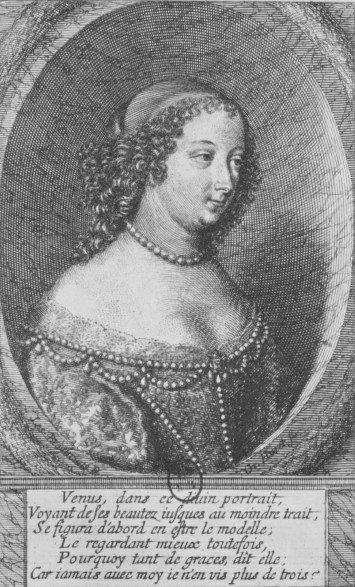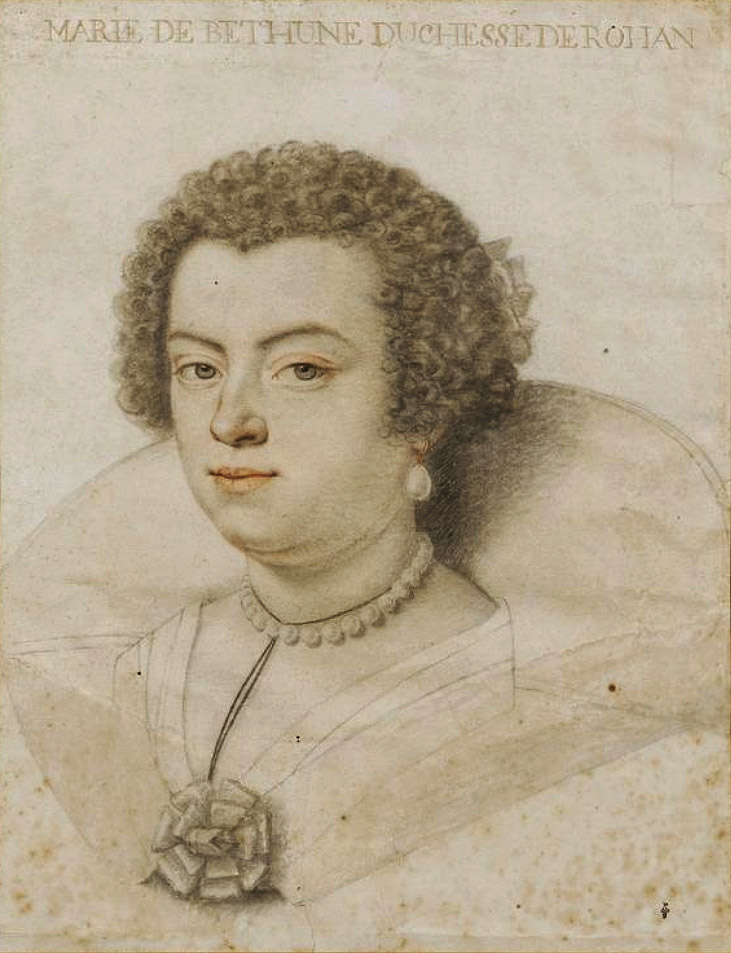The house of Rohan occupied an immensely prestigious position both at court and in society as whole. By the early years of Louis XIV's reign, the family was headed by Henri de Rohan, Duc de Rohan, who had married Marguerite de Béthune. The couple had not been fortunate regarding children; having been married in 1603, it was not until 1617 that Marguerite finally gave birth to their only child.
The newborn was a girl - much to the disappointment of the family as girls were prohibited from inheriting. Nevertheless, the young child flourished and was named after her mother, Marguerite. Once it became obvious that the couple would have no more children, Marguerite was made sole heiress of her father's fortune and title. This arrangement was only possible because the king accepted her position.
Once she became of marriageable age, Marguerite de Rohan was quite the catch. As her title of Duchesse de Rohan was held suo jure it would immediately be passed on to her husband when she married. She was also a Foreign Princess, as the Rohan-family classed amongst the Princes Étrangères at court. Naturally, such a dowry - including her fortune - was a tempting prospect and it was taken for granted that she would marry a duke.
However, Marguerite's teenage years passed and no marriage was agreed to, although not for lack of offers. Amongst those who proposed marriage were the Comte de Soissons who was a prince of the blood as well as a cousin to Louis XIII; she was also propositioned by foreign princes including Prince Rupert of the Rhine and the Duke of Saxe-Weimar. However, they were all rejected.
 |
| Marguerite de Rohan |
The thing was that Marguerite had fallen in love. While the object of her affection was a nobleman he was certainly not her equal. Henri de Chabot descended from an aristocratic family from Poitou but held no higher title than Seigneur de Saint-Aulaye. Henri could not claim a large fortune either or considerable land; in fact, he was the younger son and had no claim to either. What he did have was good popularity with the court (fickle as that might be) as well as the friendship of the Duc d'Enghien, as well as being a confidant of both the Duc d'Orléans (Gaston, not Philippe) and the Prince de Condé.
Despite the obvious mésalliance, Marguerite had chosen her spouse.
Marguerite was no fool. Knowing full well that her status would be decided by the man she married, she approached Anne of Austria who influenced the young Louis XIV to act on Marguerite's behalf. Thus, by 1645, the king decreed that in the case of a marriage between Marguerite de Rohan and Henri de Chabot, Marguerite would retain her position as a foreign princess at court. Furthermore, any children born to the union would be known as Rohan-Chabot rather than just Chabot.
This paved the way for the marriage and simultaneously showed the degree of influence held by the Rohan-family. Marguerite herself was aware that she could still choose not to proceed with the marriage; in fact, when she was asked about her plans, she replied "I do not know If I shall be able to marry him, but I do feel that I could not bear it if he married someone else".
In the end, Marguerite was spared that unpleasant thought. She and Henri married on 6 June 1645; they would go on to found the branch of Rohan-Chabot with their six children. In 1648, Henri was recognised as the Duc de Rohan by virtue of his wife's claim. While the ducal title thus remained in the family, the status of foreign princes was not handed down to their descendants. In stark contrast to the remaining Rohan-cousins, their children were not considered as princes étrangères.
Oddly enough, it was Marguerite's own mother who voiced the greatest objections to the union. When the king had made it clear that Marguerite and her husband would inherit Henri de Rohan, Marguerite attempted to have an alleged son of her late husband recognised as the legitimate heir. However, Parliament rejected her plea and confirmed the rights of Marguerite and the future Rohan-Chabots.
 |
| Marguerite de Béthune - mother of Marguerite who unsuccessfully attempted to strip her daughter of her inheritance |
However, was the story truly a love match? It has been suggested that Marguerite agreed to marry Henri de Chabot because the king promised her the continuance of her rank and status at court. This would explain why Marguerite apparently remained somewhat uncertain on whether to actually go through with the marriage beforehand.
In fact, the Crown had a very good reason to wish for such a seemingly disproportionate marriage. Henri de Rohan - Marguerite's father - had become aligned with the Protestant cause. In contrast, Chabot was a Catholic. By marrying Marguerite to Henri de Chabot, Marguerite would have to convert to Catholicism, thus bringing the dukedom once more under the Catholic faith. The mother of the bride herself was a staunch Protestant which, again, would explain her extreme reluctance to allow the marriage.
If Marguerite had been entirely opposed to the marriage herself, she would have found herself in an unpleasant situation. The Crown would not have appreciated the refusal and the king could have withdrawn his consent to any other proposed marriage; in that case, he would simply have to wait until Marguerite either died or became too old to have children. That would ensure the end of this branch of the Rohan-line and would have been a far bleaker prospect for Marguerite herself.
All matters considered, this union would seem to be the rare example of duty meeting love. Marguerite was - by all accounts - smitten with Henri which certainly lessened any qualms she might have had at the prospect of marrying beneath her. Besides, their marriage appears to have been a happy one. If one is to look at the positives, neither party had much reason to complain of the other at the time of the marriage. While Marguerite's riches and status has already been discussed, she was further considered to be quite beautiful. Henri, meanwhile, was said to have both a handsome face and a well-made figure. In other words, they would have made a handsome couple - together they could enjoy her riches and rank and his connections at court. While the latter might seem a small bargaining tool, it is worth noting that both the Prince de Condé and the Prince de Conti took Henri's side in a later quarrel with the Duc de La Meilleraye.
As is often the case, the true feelings of the people involved are lost to history; what is more certain is that the marriage caused quite a scandal in 1645.

No comments:
Post a Comment